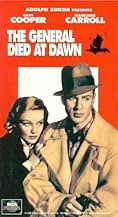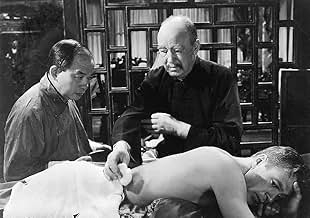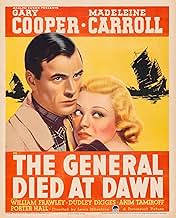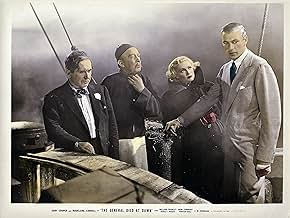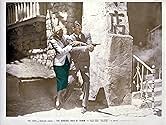CALIFICACIÓN DE IMDb
6.5/10
1.4 k
TU CALIFICACIÓN
Agrega una trama en tu idiomaAmid the anarchy of China, an American mercenary tangles with a ruthless warlord.Amid the anarchy of China, an American mercenary tangles with a ruthless warlord.Amid the anarchy of China, an American mercenary tangles with a ruthless warlord.
- Dirección
- Guionistas
- Elenco
- Nominado a 3 premios Óscar
- 1 premio ganado y 3 nominaciones en total
Lee Tong Foo
- Mr. Chen
- (as Lee Tung-Foo)
Hans Fuerberg
- Yang's Military Advisor
- (as Hans Furberg)
Irene Bennett
- Passenger
- (sin créditos)
Spencer Chan
- Killer
- (sin créditos)
Thomas Chan
- Houseboy
- (sin créditos)
- Dirección
- Guionistas
- Todo el elenco y el equipo
- Producción, taquilla y más en IMDbPro
Opiniones destacadas
"The General Died at Dawn" features Gary Cooper in a role similar to the one he played in "For Whom the Bell Tolls" a couple of years later. Directed by Lewis Milestone the movie is visually stunning and exciting. Madeleine Carroll (fresh from her success in Hitchcock's "The 39 Steps")is very good as Cooper's love interest.Akim Tamiroff was nominated for an Oscar as the General.He's certainly a menacing figure here.But I think Philip Ahn as his second in command delivers the best performance.What subtle fanaticism he conveys.The movie is full of interesting twists in the storyline and except for the ending,which I found a bit silly,it is a solid movie.
The General Died at Dawn, the title itself is enough of a giveaway as to what happens. But the circumstances leading up to the death of Chinese Warlord Akim Tamiroff is quite a tale.
The setting for this film is Kuomintang China where the government of Chiang Kai-Shek doesn't have its writ run very far. Most of China in the Twenties is controlled by various provincial warlords. In fact a case could be made that the Chinese Communists under Mao Tse-tung was viewed as just another warlord. But that's a whole different story.
American adventurer Gary Cooper has a money belt with a whole lot of cash in it entrusted to him by the opposition faction to Akim Tamiroff. He's supposed to make contact with William Frawley in Shanghai who when he's not drinking the hotel bar dry, runs guns.
But Madeleine Carroll and her father Porter Hall who are working for Tamiroff help Tamiroff part Cooper from his money. In the case of Coop, he's real guilty of thinking with his gonads. Then Porter Hall steals the money for himself and the film gets real interesting.
There's one big flaw in the film, occurring when Madeleine Carroll who starts falling for Cooper, refers to him as the "O'Hara Boy." O'Hara is Cooper's character name. Coop was 35 when this film was made and referring to him as 'boy' was ludicrous. But then again a man of 35 should have been on better guard. Film might have worked better if someone younger like Robert Taylor or Tyrone Power played the part of O'Hara. Or Clifford Odets's script should have given Carroll a more elaborate ruse to play on Cooper.
Two major oriental roles were given to occidental players. Casting like Akim Tamiroff as the warlord Yang and Dudley Digges as Mr. Wu who employs Cooper would never happen today. But both do well and come to think of it Tamiroff does have an oriental strain in his ancestry.
One bit of casting really hits home. By all accounts William Frawley was hardly the lovable tightwad Fred Mertz in real life. He was a misanthropic alcoholic in the tradition of W.C.Fields and a mean drunk when he was loaded which was often back then. His role as Brighton, the misanthropic, mean, and thoroughly racist gunrunner was way closer to the real Bill Frawley.
Gary Cooper in The General Died at Dawn was playing a role that Humphrey Bogart would probably have done in the forties. It was always joked that Cooper's dialog consisted of 'yup' and 'nope.' But the way he gets himself, Carroll and Digges out of a real predicament in the end called for quite a gift of gab.
The setting for this film is Kuomintang China where the government of Chiang Kai-Shek doesn't have its writ run very far. Most of China in the Twenties is controlled by various provincial warlords. In fact a case could be made that the Chinese Communists under Mao Tse-tung was viewed as just another warlord. But that's a whole different story.
American adventurer Gary Cooper has a money belt with a whole lot of cash in it entrusted to him by the opposition faction to Akim Tamiroff. He's supposed to make contact with William Frawley in Shanghai who when he's not drinking the hotel bar dry, runs guns.
But Madeleine Carroll and her father Porter Hall who are working for Tamiroff help Tamiroff part Cooper from his money. In the case of Coop, he's real guilty of thinking with his gonads. Then Porter Hall steals the money for himself and the film gets real interesting.
There's one big flaw in the film, occurring when Madeleine Carroll who starts falling for Cooper, refers to him as the "O'Hara Boy." O'Hara is Cooper's character name. Coop was 35 when this film was made and referring to him as 'boy' was ludicrous. But then again a man of 35 should have been on better guard. Film might have worked better if someone younger like Robert Taylor or Tyrone Power played the part of O'Hara. Or Clifford Odets's script should have given Carroll a more elaborate ruse to play on Cooper.
Two major oriental roles were given to occidental players. Casting like Akim Tamiroff as the warlord Yang and Dudley Digges as Mr. Wu who employs Cooper would never happen today. But both do well and come to think of it Tamiroff does have an oriental strain in his ancestry.
One bit of casting really hits home. By all accounts William Frawley was hardly the lovable tightwad Fred Mertz in real life. He was a misanthropic alcoholic in the tradition of W.C.Fields and a mean drunk when he was loaded which was often back then. His role as Brighton, the misanthropic, mean, and thoroughly racist gunrunner was way closer to the real Bill Frawley.
Gary Cooper in The General Died at Dawn was playing a role that Humphrey Bogart would probably have done in the forties. It was always joked that Cooper's dialog consisted of 'yup' and 'nope.' But the way he gets himself, Carroll and Digges out of a real predicament in the end called for quite a gift of gab.
Did you ever come in late to a movie and miss the beginning? You have to try hard to concentrate and catch up, all the while feeling off-balance and wondering how much you missed. That's the way this picture starts off, and I spent some time trying to 'fit in' to the plot. But this film's plot moves at break-neck speed and made me think it is an editing flaw.
Having recovered, I found the story completely original and refreshing (can't think of too many Chinese Civil War flicks!). I also found a lack of tension - what's the opposite of nerve-wracking? - as there is no sense of urgency to the proceedings. The principals were just fine; Gary Cooper, Madeleine Carroll and Akim Tamiroff, and special mention must be made of Philip Ahn, who was the personification of evil Japanese military in many WWII pictures.
It is worth viewing but is a minor entry in the Gary Cooper canon. I liked it and recommend it but I plan to watch it again soon because I think it is one of those pictures in which some subtlety is overlooked in only one viewing.
Having recovered, I found the story completely original and refreshing (can't think of too many Chinese Civil War flicks!). I also found a lack of tension - what's the opposite of nerve-wracking? - as there is no sense of urgency to the proceedings. The principals were just fine; Gary Cooper, Madeleine Carroll and Akim Tamiroff, and special mention must be made of Philip Ahn, who was the personification of evil Japanese military in many WWII pictures.
It is worth viewing but is a minor entry in the Gary Cooper canon. I liked it and recommend it but I plan to watch it again soon because I think it is one of those pictures in which some subtlety is overlooked in only one viewing.
O'Hara (Gary Cooper) is on a mission to deliver money to Mr Wu (Dudley Digges) so that Mr Wu can buy weapons from Brighton (William Frawley) in his struggle against the Chinese warlord General Yang (Akim Tamiroff). However, he is betrayed by Judy Perrie (Madeleine Carroll) and her father Peter Perrie (Porter Hall) and is captured by Yang on a train. He hands over the money and is taken hostage but escapes and determines to get the money back.......
This film is pretty confusing and you have to pay attention to keep up. It still loses you in parts, though, especially at the beginning. The cast are nothing special and fall in between the extremes of Akim Tamiroff who is excellent as the warlord and William Frawley who is dreadful in every scene that he appears in. Frawley also has an awful, raspy-throat voice which really invades your brain. He manages to produce a very offensive performance and it doesn't help the film at all.
The story confuses at the beginning, then levels out into semi-tedium with unbelievability factor 10. The way in which Cooper breezes through the film with his cocky manner is pure phoniness (he would have been killed at his first meeting with Yang). The plot is also somewhat cheapened by the way that General Yang meets his death. Frawley's involvement in the final denouement is an outrageous con to those who are looking forward to a good climax.
The film is done in such a way as to preach to the viewer and this stand of taking the moral high ground insults the audience...........Shut up, Cooper!!..... There is also some really crass dialogue in the love scenes. Overall, the film is a let-down.
This film is pretty confusing and you have to pay attention to keep up. It still loses you in parts, though, especially at the beginning. The cast are nothing special and fall in between the extremes of Akim Tamiroff who is excellent as the warlord and William Frawley who is dreadful in every scene that he appears in. Frawley also has an awful, raspy-throat voice which really invades your brain. He manages to produce a very offensive performance and it doesn't help the film at all.
The story confuses at the beginning, then levels out into semi-tedium with unbelievability factor 10. The way in which Cooper breezes through the film with his cocky manner is pure phoniness (he would have been killed at his first meeting with Yang). The plot is also somewhat cheapened by the way that General Yang meets his death. Frawley's involvement in the final denouement is an outrageous con to those who are looking forward to a good climax.
The film is done in such a way as to preach to the viewer and this stand of taking the moral high ground insults the audience...........Shut up, Cooper!!..... There is also some really crass dialogue in the love scenes. Overall, the film is a let-down.
Between masterworks such as "All Quiet on the Western Front" (1930) and "The Strange Love of Martha Ivers" (1945) the Moldovan born Lewis Milestone had a mixed career. He made a bunch of good movies, a bunch of bad ones, and several bunches of films that have just been forgotten. Somewhere in here we also encounter "The General Died at Dawn" (1936), an interesting adventure film set in China. The film features the first screenplay by Clifford Odets, then one of the hottest playwrights around. Even though the film boasts a charismatic ensemble of actors, it often feels like the real star here is the screenplay.
The movies opens very strong. We are introduced to the plight of the poor Chinese, who struggle against a ruthless warlord General Yang, played by Akim Tamiroff in an Oscar-nominated role. Gary Cooper is our idealist hero, a guy who could never catch an even break, and is now trying to give the Chinese one. Coop is something of a spy, carrying important money shipment to the people fighting Yang, but unfortunately Yang has his own spies and is very much on to him...
I would go as far as to call the first half an hour (or so) of this film a masterpiece. Coop is introduced wonderfully, he has a monkey named Sam as a sidekick, and the whole train sequence, featuring the female lead Madeleine Carroll, and eventually Tamiroff as Yang, is wonderfully written. The suspense of the narrative feels real, but the screenplay also has time to be witty and funny. Cooper gets great lines, and throws a few unexpected (yet so enjoyable) punches around as well. I laughed a bunch and was rooting for the hero, rooting for the film really.
Unfortunately after the first third of the film, the narrative takes several missteps. All the important characters go their different ways for too long of a period, and by the time they are all in the same space again, the film has lost its momentum. The ending is not bad, but it is nothing breathtaking either. The film also runs into some trouble, when it can't quite decide, how it wants to portray General Yang and his men.
Still, I would very much recommend this to fans of classic Hollywood. Cooper gets a really good role as our hero, and Tamiroff is very memorable as Yang. Tamiroff was originally Armenian, so in Hollywood-land, that will have to pass as Chinese. I do, however, seriously wish they hadn't turned poor Dudley Digges into Mr. Wu. That was a bit cringe-worthy.
The movies opens very strong. We are introduced to the plight of the poor Chinese, who struggle against a ruthless warlord General Yang, played by Akim Tamiroff in an Oscar-nominated role. Gary Cooper is our idealist hero, a guy who could never catch an even break, and is now trying to give the Chinese one. Coop is something of a spy, carrying important money shipment to the people fighting Yang, but unfortunately Yang has his own spies and is very much on to him...
I would go as far as to call the first half an hour (or so) of this film a masterpiece. Coop is introduced wonderfully, he has a monkey named Sam as a sidekick, and the whole train sequence, featuring the female lead Madeleine Carroll, and eventually Tamiroff as Yang, is wonderfully written. The suspense of the narrative feels real, but the screenplay also has time to be witty and funny. Cooper gets great lines, and throws a few unexpected (yet so enjoyable) punches around as well. I laughed a bunch and was rooting for the hero, rooting for the film really.
Unfortunately after the first third of the film, the narrative takes several missteps. All the important characters go their different ways for too long of a period, and by the time they are all in the same space again, the film has lost its momentum. The ending is not bad, but it is nothing breathtaking either. The film also runs into some trouble, when it can't quite decide, how it wants to portray General Yang and his men.
Still, I would very much recommend this to fans of classic Hollywood. Cooper gets a really good role as our hero, and Tamiroff is very memorable as Yang. Tamiroff was originally Armenian, so in Hollywood-land, that will have to pass as Chinese. I do, however, seriously wish they hadn't turned poor Dudley Digges into Mr. Wu. That was a bit cringe-worthy.
¿Sabías que…?
- TriviaThe main character, O'Hara, is based on the real-life adventurer Morris "Two-Gun" Cohen (1887-1970). Born in Poland to a Jewish family, Cohen grew up in the tough streets of London's East End. As a teenager, he moved to western Canada and became a ranch hand and gambler in Saskatchewan, and later a highly successful real-estate agent in Alberta. During World War I he fought in Europe with the Canadian Railway Troops. His friendship with Chinese workers on the Canadian-Pacific Railroad prompted him to go to China in the 1920s. After negotiating a railroad deal with Dr. Yat-sen Sun, Cohen became a personal bodyguard to Sun and a trainer of Sun's private army. After Sun's death in 1925, Cohen ran guns for various Chinese warlords throughout the 1930s. When the Japanese invaded China in 1937, Cohen continued to supply Chinese resistance forces with arms and served with the British SOE. In 1941, following the fall of Hong Kong, he was captured by the Japanese and put in a prison camp, but was traded to the English in 1943 in a rare prisoner exchange. After the war, Cohen continued to operate in China as an agent for various British firms, including Rolls-Royce and Decca Radar. His former dealings with Chinese warlords kept him in good standing with Chinese Communist officials until his death in 1970.
- ErroresWhile arguing with Peter, Judy slams a book down on the desk. A couple of other books on the corner of the desk disappear in a later scene.
- Créditos curiososThe opening credits all appear on the sails of boats.
- ConexionesFeatured in Red Hollywood (1996)
Selecciones populares
Inicia sesión para calificar y agrega a la lista de videos para obtener recomendaciones personalizadas
- How long is The General Died at Dawn?Con tecnología de Alexa
Detalles
- Fecha de lanzamiento
- País de origen
- Idioma
- También se conoce como
- Chinese Gold
- Locaciones de filmación
- Productora
- Ver más créditos de la compañía en IMDbPro
- Tiempo de ejecución
- 1h 38min(98 min)
- Color
- Relación de aspecto
- 1.37 : 1
Contribuir a esta página
Sugiere una edición o agrega el contenido que falta

